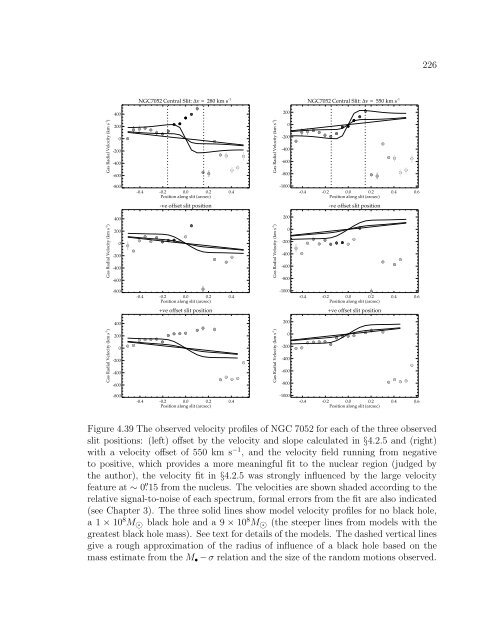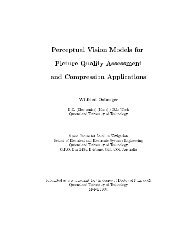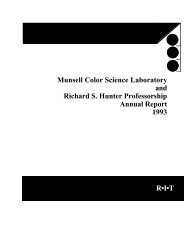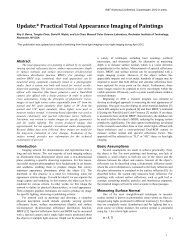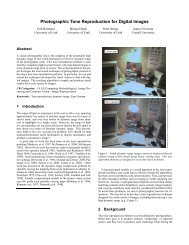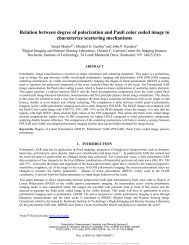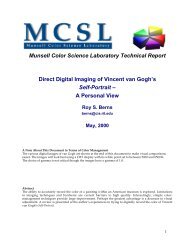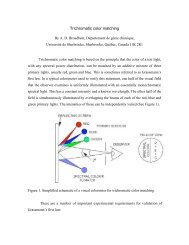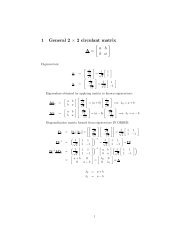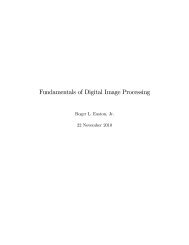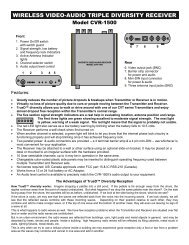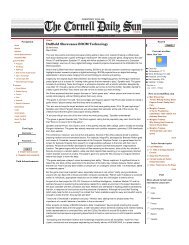- Page 1 and 2:
Gas Disks and Supermassive Black Ho
- Page 3 and 4:
Abstract Gas Disks and Supermassive
- Page 5 and 6:
Contents 1 Introduction 1 1.1 Radio
- Page 7 and 8:
4.2.3 Stellar luminosity densities
- Page 9 and 10:
List of Tables 1.1 Properties of va
- Page 11 and 12:
5.1 Weighted mean kinematic paramet
- Page 13 and 14:
2.12 Optical continuum image of the
- Page 15 and 16:
4.14 Data-Model residuals with vary
- Page 17 and 18:
Acknowledgments First I would like,
- Page 19 and 20:
Chapter 1 Introduction The relation
- Page 21 and 22:
1.1 Radio galaxies A radio galaxy c
- Page 23 and 24:
This thesis focuses on a sample of
- Page 25 and 26:
et al., 2000; Tomita et al., 2000;
- Page 27 and 28:
larger than the generally expected
- Page 29 and 30:
most reliable is, of course, by the
- Page 31 and 32:
galaxies were obtained with the Fai
- Page 33 and 34:
• What connections can be found b
- Page 35 and 36:
Table 1.2. Reliable black hole mass
- Page 37 and 38:
Figure 1.2 An example of a FR-I (le
- Page 39 and 40:
Figure 1.4 From Martel et al. (2000
- Page 41 and 42:
Figure 1.6 The famous cartoon by Ph
- Page 43 and 44:
M BH (M Sun) 10 10 10 9 10 8 10 7 1
- Page 45 and 46:
dish flux density measurements at 1
- Page 47 and 48:
2.2.1 Radio properties Radio observ
- Page 49 and 50:
scribed by Verdoes Kleijn et al. (1
- Page 51 and 52:
Table 2.2. Multiwavelength Fluxes o
- Page 53 and 54:
0.5" Figure 2.1 Optical continuum i
- Page 55 and 56:
0.5" Figure 2.3 Optical continuum i
- Page 57 and 58:
0.5" Figure 2.5 Optical continuum i
- Page 59 and 60:
0.5" Figure 2.7 Optical continuum i
- Page 61 and 62:
0.5" Figure 2.9 Optical continuum i
- Page 63 and 64:
0.5" Figure 2.11 Optical continuum
- Page 65 and 66:
0.5" Figure 2.13 Optical continuum
- Page 67 and 68:
0.5" Figure 2.15 Optical continuum
- Page 69 and 70:
0.5" Figure 2.17 Optical continuum
- Page 71 and 72:
0.5" Figure 2.19 Optical continuum
- Page 73 and 74:
0.5" Figure 2.21 Optical continuum
- Page 75 and 76:
Chapter 3 STIS spectroscopy of the
- Page 77 and 78:
spectra in a future paper. We inclu
- Page 79 and 80:
3.2.1 Data Reduction We used the st
- Page 81 and 82:
λvac − λair λair = 6.4328 × 1
- Page 83 and 84:
line flux of the Hα line and colum
- Page 85 and 86:
3.3.3 Quantifying error sources The
- Page 87 and 88:
and velocity dispersions (dominated
- Page 89 and 90:
slits were aligned to a mean of the
- Page 91 and 92:
windows. The central kinematic and
- Page 93 and 94:
(slit one) than the central positio
- Page 95 and 96:
(see key in Figure 3.1 for an expla
- Page 97 and 98:
the gas exhibits a regular rotation
- Page 99 and 100:
show the relationship between the t
- Page 101 and 102:
3.5.2 Flux ratios and ionization In
- Page 103 and 104:
them to the samples of LINERS by Ho
- Page 105 and 106:
lines. 5. Flux-unconstrained Broad
- Page 107 and 108:
Table 3.1. HST-STIS G750M observing
- Page 109 and 110:
Table 3.3. Position angles of vario
- Page 111 and 112:
Table 3.5. NGC 193: Measured Parame
- Page 113 and 114:
Table 3.7. NGC 383: Measured Parame
- Page 115 and 116:
Table 3.9. NGC 741: Measured Parame
- Page 117 and 118:
Table 3.11. NGC 2329: Measured Para
- Page 119 and 120:
Table 3.13. NGC 3801: Measured Para
- Page 121 and 122:
Table 3.15. UGC 7115: Measured Para
- Page 123 and 124:
Table 3.17. NGC 4335: Measured Para
- Page 125 and 126:
Table 3.19. NGC 4486: Measured Para
- Page 127 and 128:
Table 3.21. NGC 5141: Measured Para
- Page 129 and 130:
Table 3.23. NGC 7052: Measured Para
- Page 131 and 132:
Table 3.25. NGC 7626: Measured Para
- Page 133 and 134:
Table 3.27. Presence of a Nuclear B
- Page 135 and 136:
Table 3.29. Fits to the central pix
- Page 137 and 138:
Table 3.31. Comparison of broad lin
- Page 139 and 140:
(a) (b) (i) (ii) (c) (i) (ii) (iii)
- Page 141 and 142:
Intensity (erg s −1 cm −2 Å
- Page 143 and 144:
Intensity (erg s −1 cm −2 Å
- Page 145 and 146:
Intensity (erg s −1 cm −2 Å
- Page 147 and 148:
Intensity (erg s −1 cm −2 Å
- Page 149 and 150:
Intensity (erg s −1 cm −2 Å
- Page 151 and 152:
Intensity (erg s −1 cm −2 Å
- Page 153 and 154:
Intensity (erg s −1 cm −2 Å
- Page 155 and 156:
Intensity (erg s −1 cm −2 Å
- Page 157 and 158:
Intensity (erg s −1 cm −2 Å
- Page 159 and 160:
Intensity (erg s −1 cm −2 Å
- Page 161 and 162:
Difference in mean velocity on each
- Page 163 and 164:
Mean velocity dispersion (km s -1 )
- Page 165 and 166:
Chapter 4 Modeling gas in gravitati
- Page 167 and 168:
4.2 Thin disk models with and witho
- Page 169 and 170:
gas disks were computed by making a
- Page 171 and 172:
intensity contours are aligned conc
- Page 173 and 174:
4.2.4 Dynamical models As discussed
- Page 175 and 176:
are described in Appendix A of van
- Page 177 and 178:
models integrating using 150 by 150
- Page 179 and 180:
models. Pronounced differences can
- Page 181 and 182:
NGC 383: This S0 galaxy has a nucle
- Page 183 and 184:
at an offset of 80 km s −1 , equi
- Page 185 and 186:
gas velocities are very well settle
- Page 187 and 188:
NGC 5141: This S0 galaxy has a nucl
- Page 189 and 190:
e compatible with a ∼ 9 × 10 8 M
- Page 191 and 192:
hole masses for these galaxies. The
- Page 193 and 194: numerical approaches they made the
- Page 195 and 196: In the positive offset slit of NGC
- Page 197 and 198: 4.5 Conclusions In this chapter we
- Page 199 and 200: low statistical significance) possi
- Page 201 and 202: Table 4.2. STIS PSF Parameters. Gau
- Page 203 and 204: Table 4.4. Mass to light ratio (Υ)
- Page 205 and 206: Table 4.6. Black hole signatures in
- Page 207 and 208: weighted 600 500 400 300 200 100 =
- Page 209 and 210: weighted 600 500 400 300 200 100 =
- Page 211 and 212: weighted 500 400 300 200 100 = 0. k
- Page 213 and 214: weighted 500 400 300 200 100 = 37.
- Page 215 and 216: weighted 500 400 300 200 100 = 50.
- Page 217 and 218: weighted 600 500 400 300 200 100 =
- Page 219 and 220: weighted 500 400 300 200 100 = -50.
- Page 221 and 222: weighted 800 600 400 200 = 280. km
- Page 223 and 224: weighted 500 400 300 200 100 = -47.
- Page 225 and 226: Gas Radial Velocity (km s -1 ) 400
- Page 227 and 228: Gas Radial Velocity (km s -1 ) Gas
- Page 229 and 230: Gas Radial Velocity (km s -1 ) Gas
- Page 231 and 232: Gas Radial Velocity (km s -1 ) Gas
- Page 233 and 234: Gas Radial Velocity (km s -1 ) Gas
- Page 235 and 236: Gas Radial Velocity (km s -1 ) Gas
- Page 237 and 238: Gas Radial Velocity (km s -1 ) 300
- Page 239 and 240: Gas Radial Velocity (km s -1 ) Gas
- Page 241 and 242: Gas Radial Velocity (km s -1 ) Gas
- Page 243: Gas Radial Velocity (km s -1 ) Gas
- Page 247 and 248: v r (km s −1 ) 5000 4800 4600 440
- Page 249 and 250: v r (km s −1 ) 4700 4600 4500 440
- Page 251 and 252: M BH (M Sun) 10 10 10 9 10 8 10 7 1
- Page 253 and 254: We showed that the mean dispersions
- Page 255 and 256: within 100 pc of the nucleus: � N
- Page 257 and 258: as face on disks are approached; th
- Page 259 and 260: the inclination of the dust disk. O
- Page 261 and 262: where we observe smaller and larger
- Page 263 and 264: on scales of 1/8 the Effective radi
- Page 265 and 266: may have some connections with the
- Page 267 and 268: is well correlated with σc (correl
- Page 269 and 270: e primarily driven by the central e
- Page 271 and 272: organized rotation. This supports t
- Page 273 and 274: Table 5.1. Weighted mean kinematic
- Page 275 and 276: Table 5.3. Correlations between kin
- Page 277 and 278: σ100 (km s -1 −−− ) 500 400
- Page 279 and 280: −−− 2 2 σ100 / ∆100 100.00
- Page 281 and 282: ε 100 (km s -1 ) 250 200 150 100 5
- Page 283 and 284: ∆ 100 (km s -1 ) 500 400 300 200
- Page 285 and 286: ε 100 (km s -1 ) 250 200 150 100 5
- Page 287 and 288: V-Band I-Band VLA Peak VLBA Peak 10
- Page 289 and 290: 42 41 40 39 38 M87 nuclear SED 37 8
- Page 291 and 292: ased on the gas kinematics? • How
- Page 293 and 294: emaining galaxies may be of particu
- Page 295 and 296:
in nearby galaxies, and is being us
- Page 297 and 298:
of the features observed in the vel
- Page 299 and 300:
From the work presented in this dis
- Page 301 and 302:
Comparing samples of active and qui
- Page 303 and 304:
Bower, G. A., Green, R. F., Danks,
- Page 305 and 306:
Herrnstein, J. R., Moran, J. M., Gr
- Page 307 and 308:
Quataert, E., & Narayan, R. 2001, A


